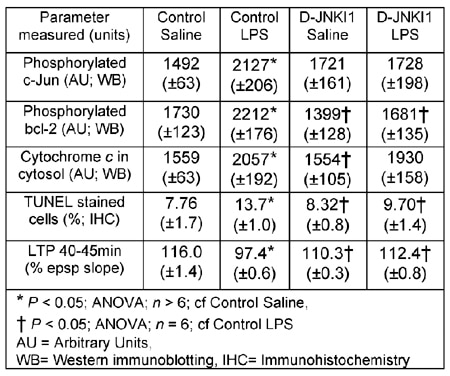Lipopolysaccharide (LPS), a component of the cell wall of Gram-negative bacteria, exerts manifold effects in the central nervous system. It has been reported that I.P. injection of LPS (100 µg kg-1) inhibits LTP in dentate gyrus. While the mechanism by which this is effected remains unclear, LPS administration is associated with activation of stress-activated protein kinases such as c-Jun N-terminal protein kinase (JNK). There is evidence linking these protein kinases to cell deterioration, possibly accounting for the LPS-induced decrease in synaptic efficacy. Here we report that I.C.V. administration of the specific JNK inhibitor D-JNKI1 (5 µl; 500 µM) attenuated the LPS-induced inhibition of LTP of perforant path-dentate gyrus granule cell synapses in urethane-anaesthetised rats.
Following electrophysiological recording, rats were humanely killed by decapitation, and the hippocampus was dissected and frozen until examined. LPS induced an increase in phosphorylated JNK expression in hippocampal tissue (1767 arbitrary units (± 88; S.E.M.) compared to 1448 (± 41) in saline-treated rats (P < 0.05; Student’s unpaired t test; n = 5). Table 1 shows that this activation of JNK by LPS triggers downstream signalling cascades, including activation of the transcription factor c-Jun and Bcl-2 phosphorylation. These changes are coupled with increased cytosolic cytochrome c expression, and Tdt-mediated dUTP nick-end labelling (TUNEL) in cytospun cells, indicative of apoptosis. Pre-treatment with D-JNKI1 attenuated these changes.
In summary, the evidence is consistent with a pivotal role for JNK in mediating the effects of LPS.
This work was supported by grants from the Health Research Board (Grant no. RP12/2001), and Enterprise Ireland (Project code BR/2001/009).

